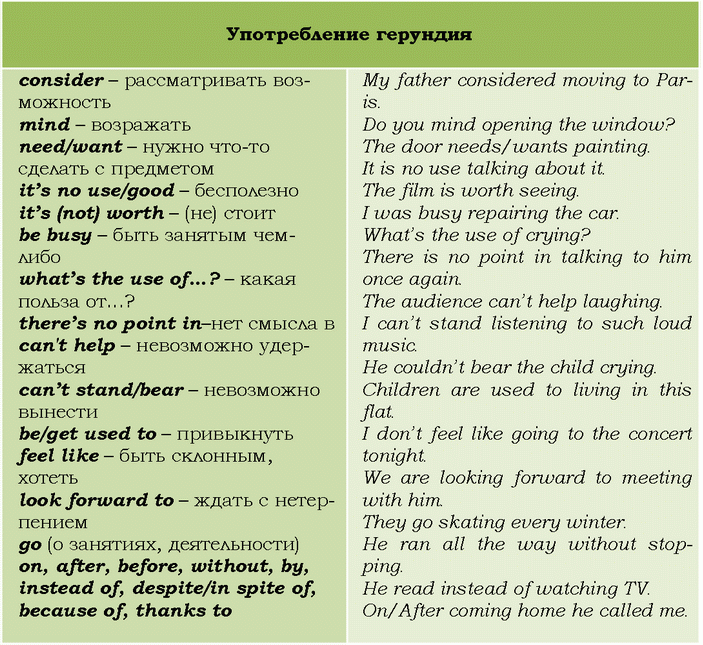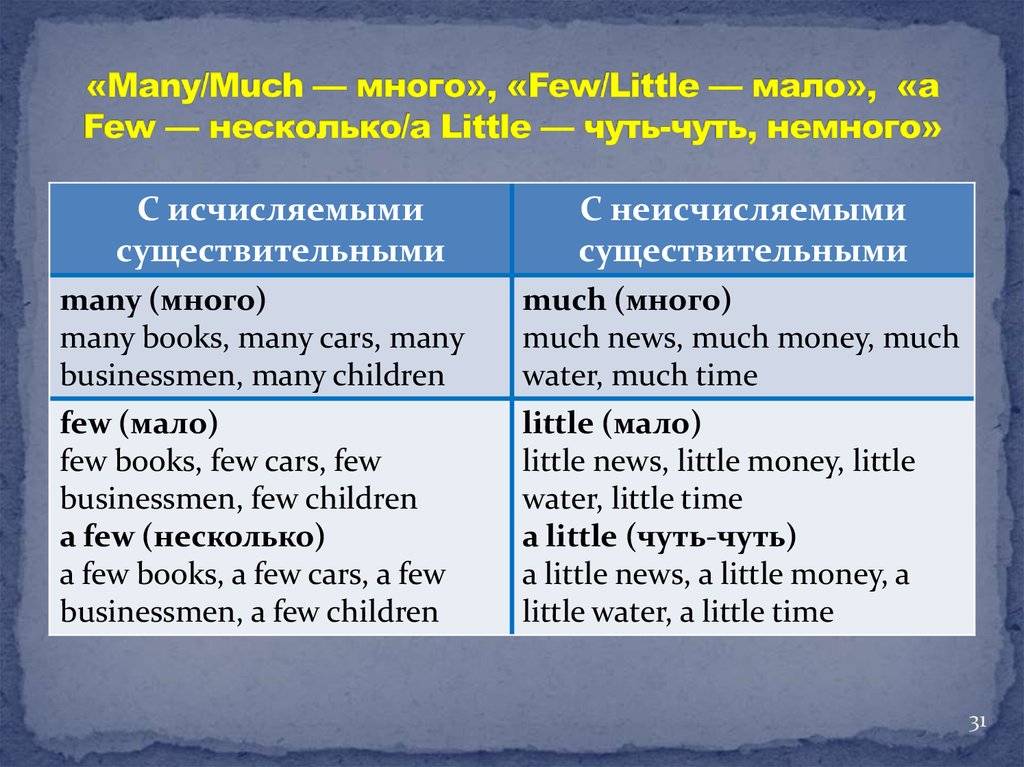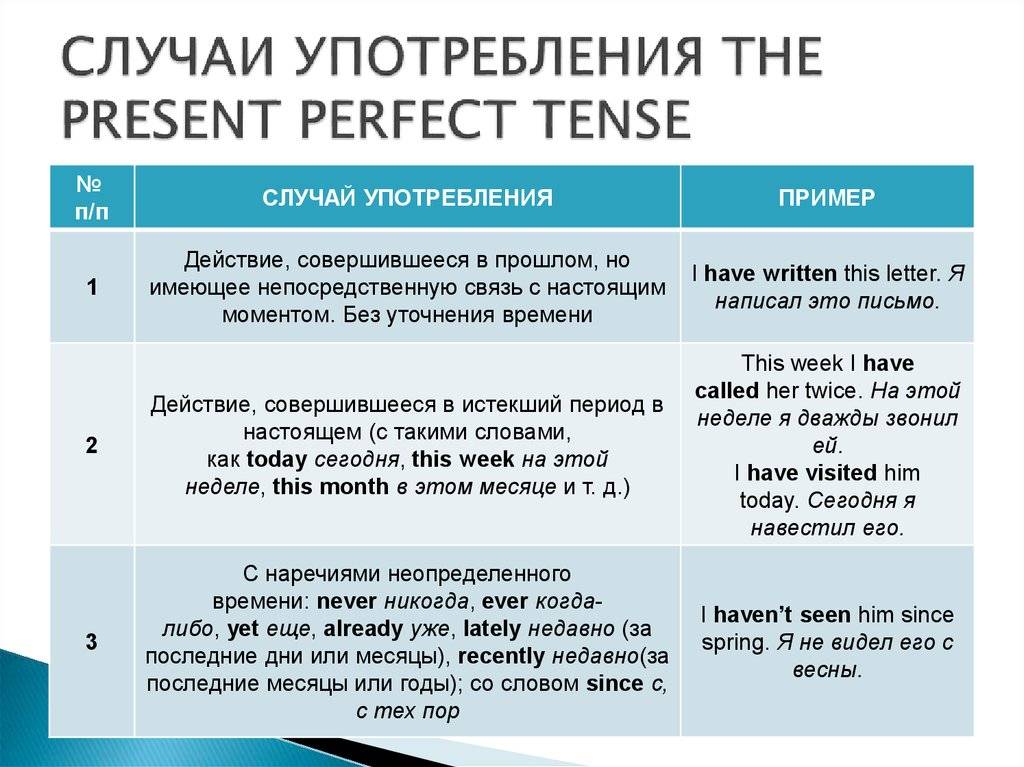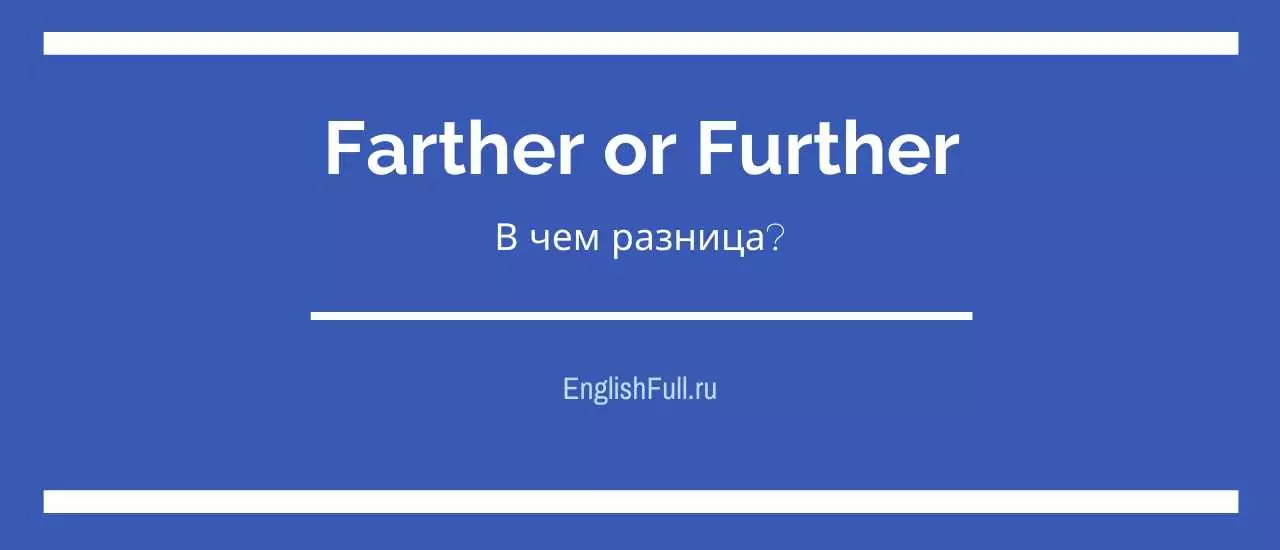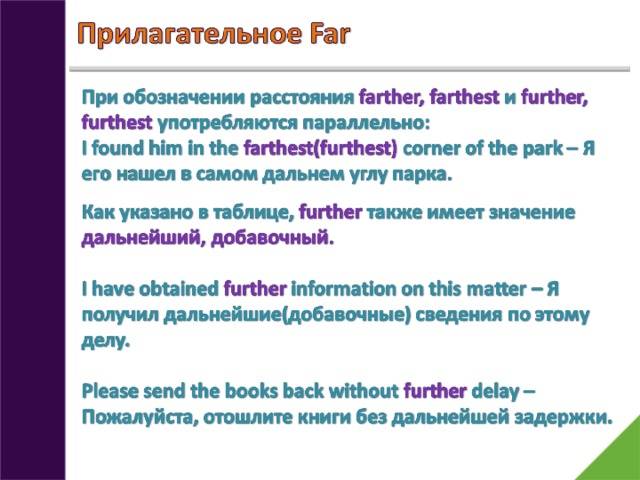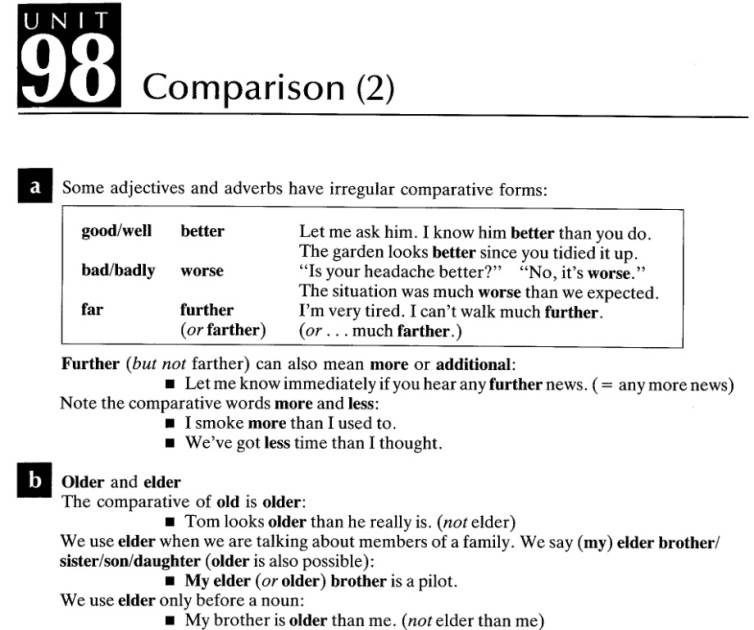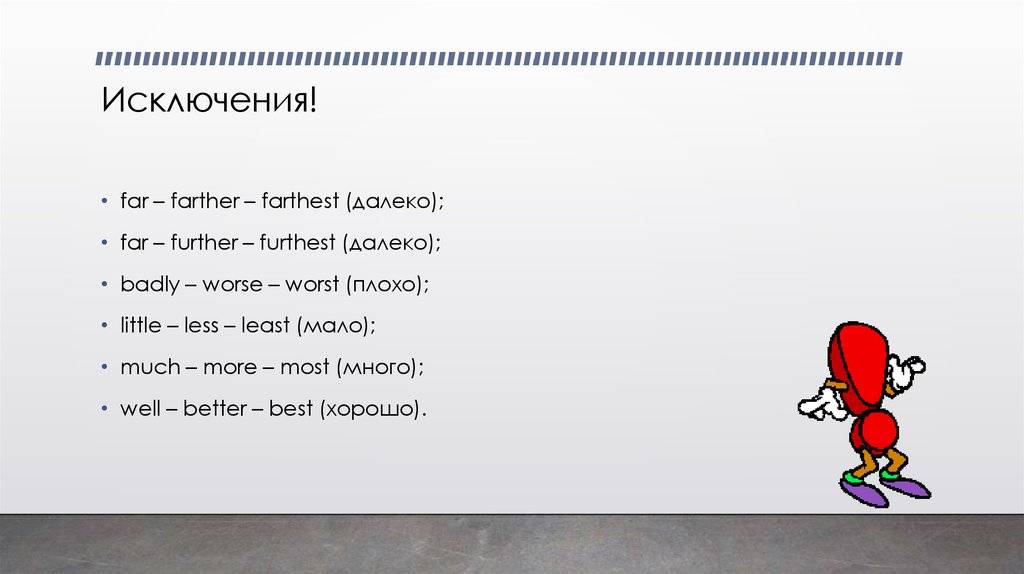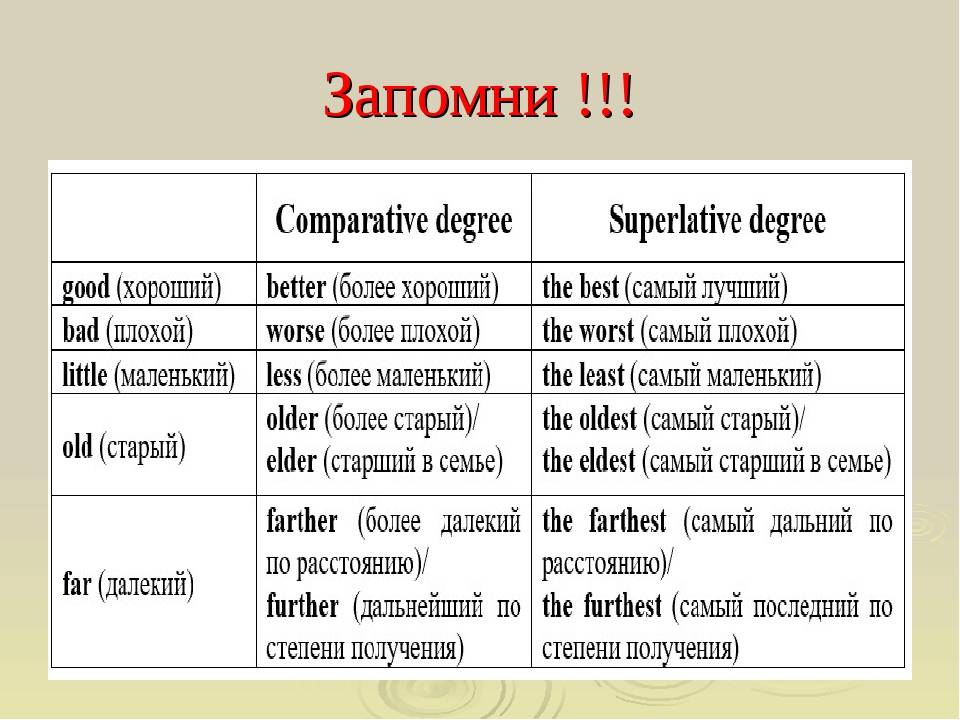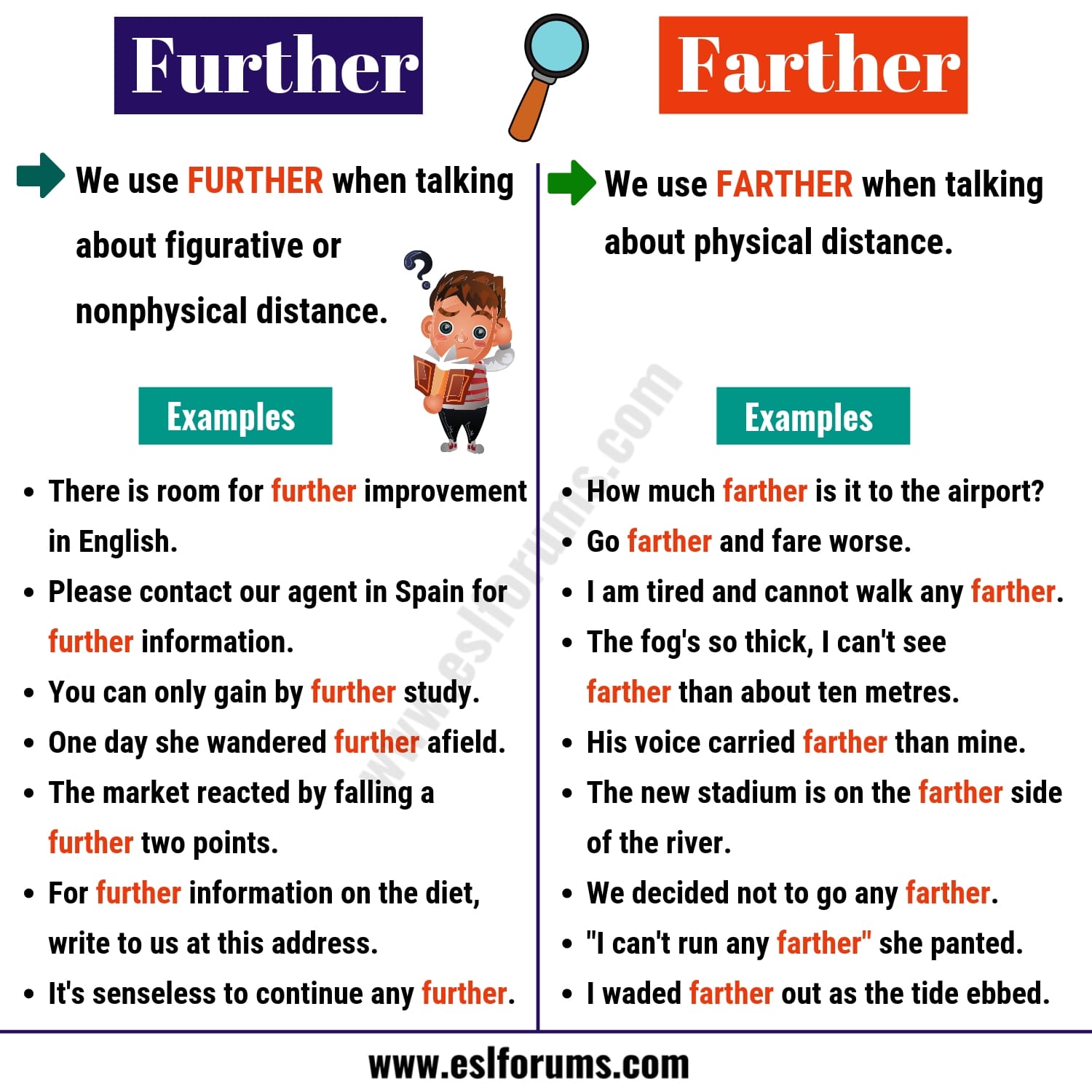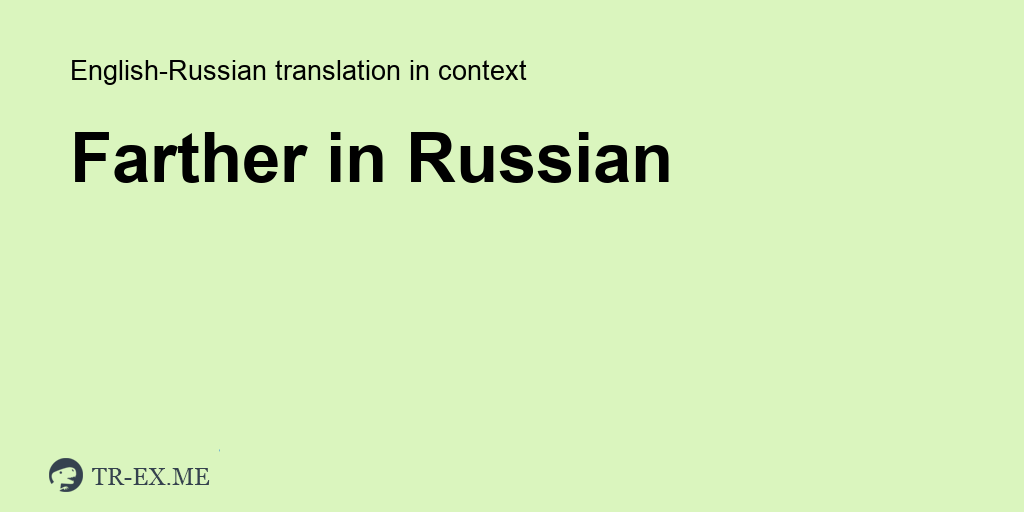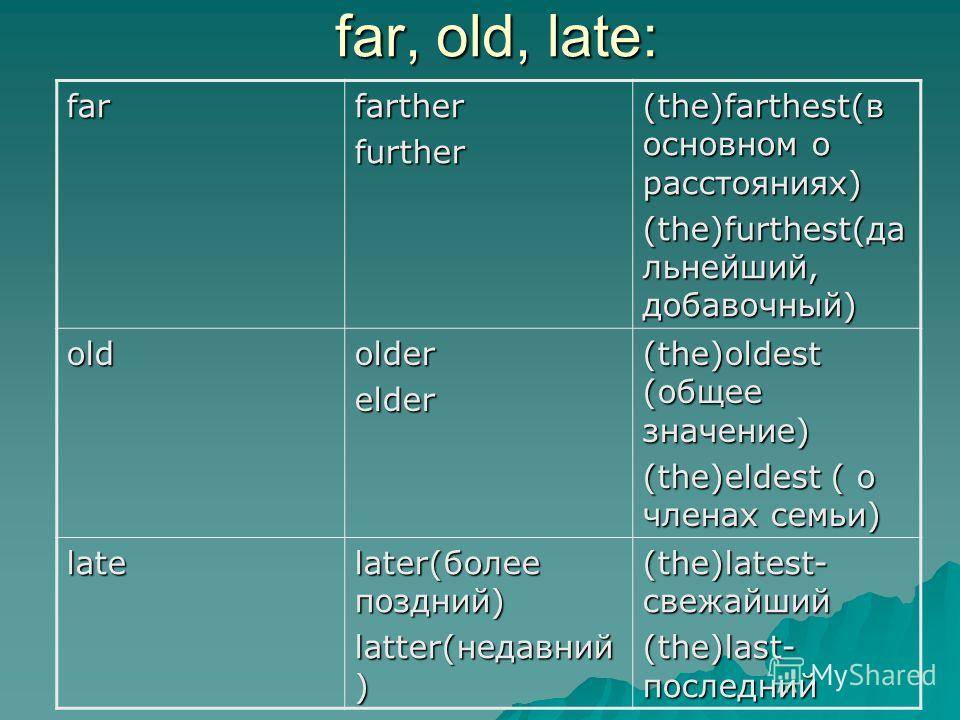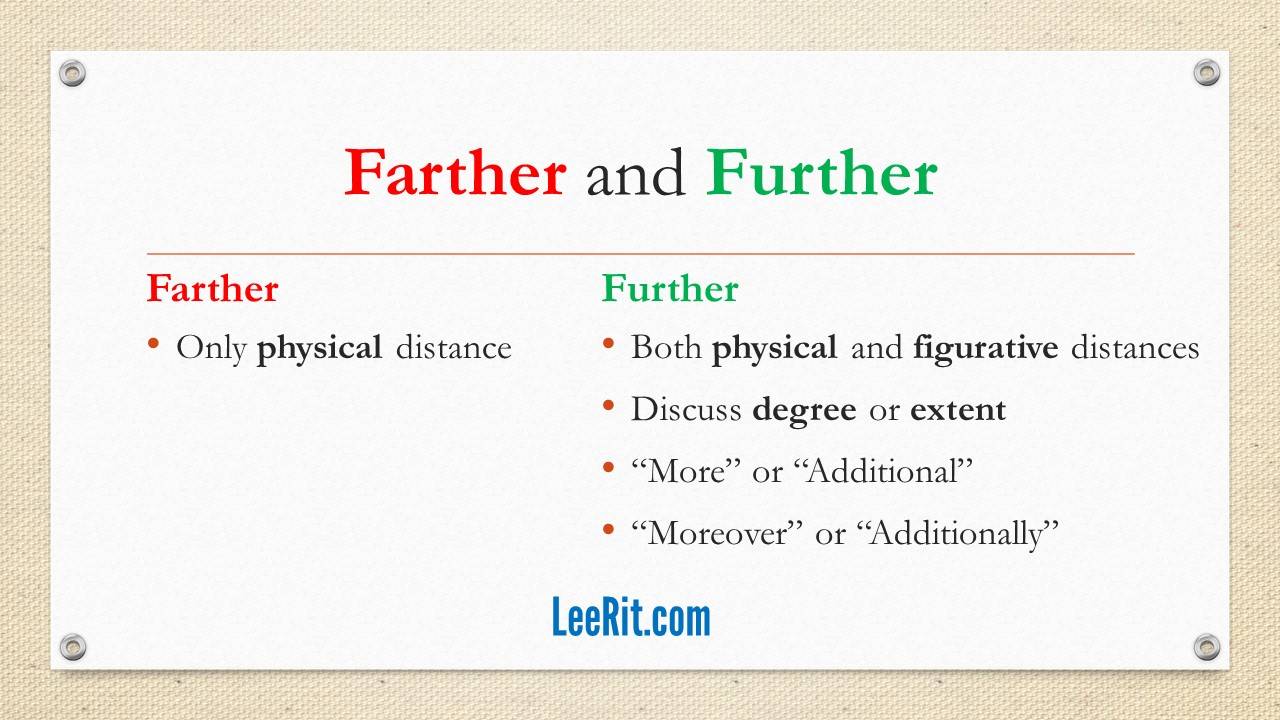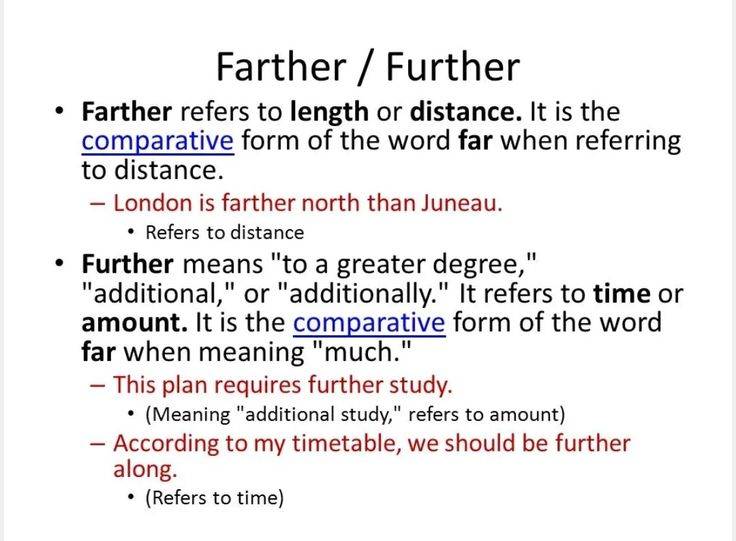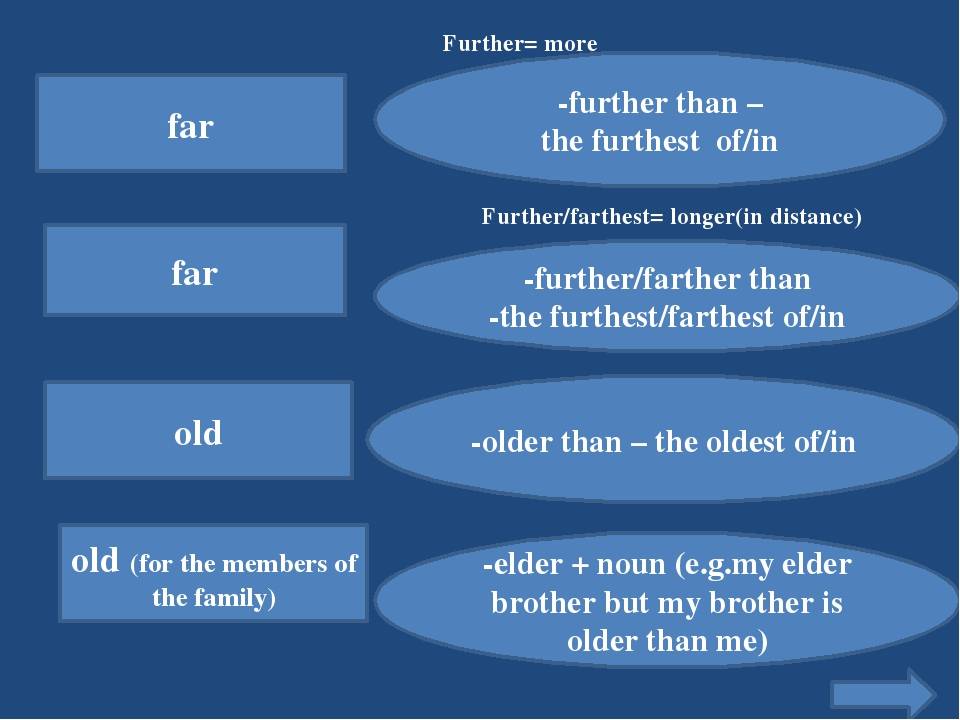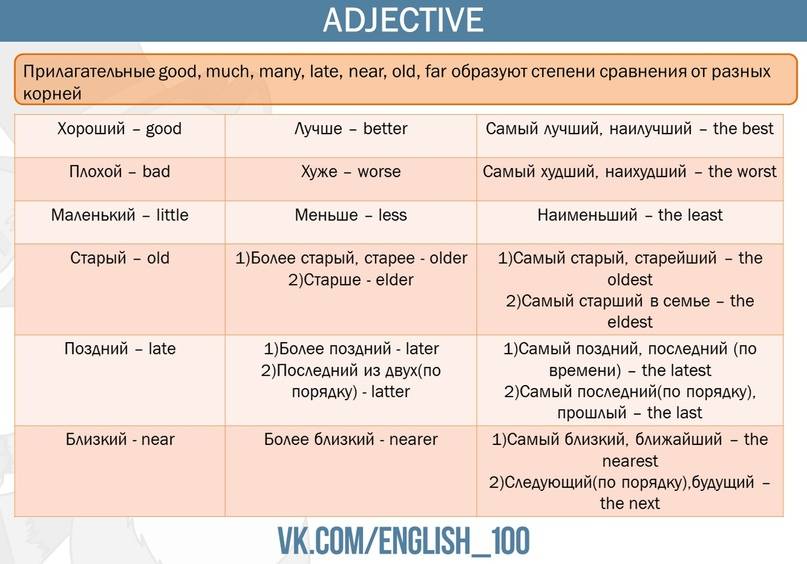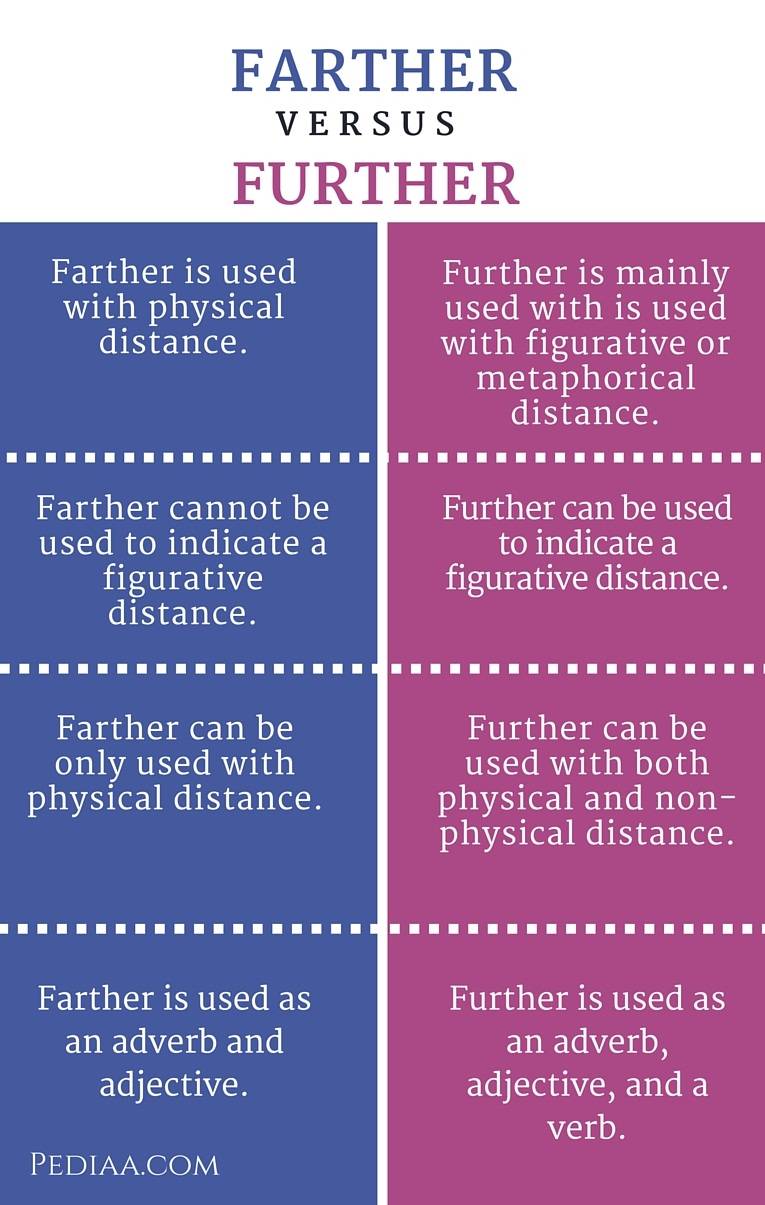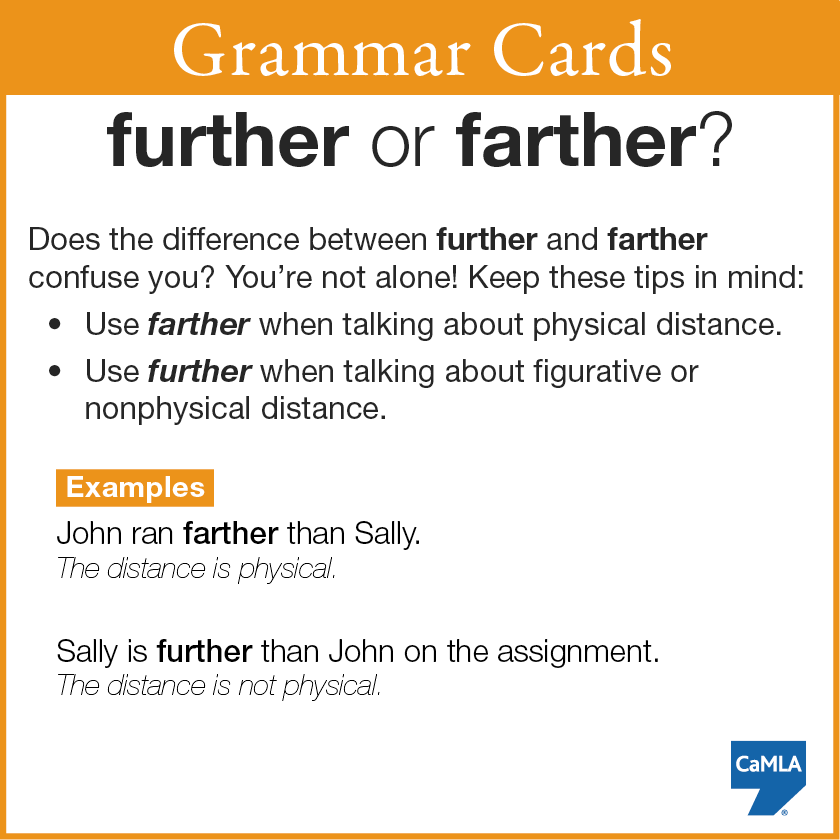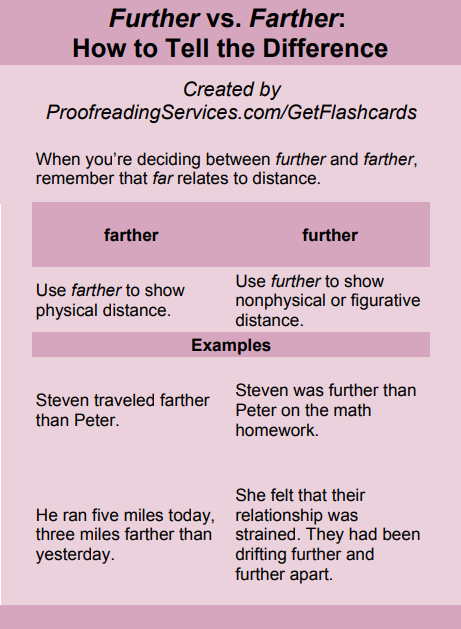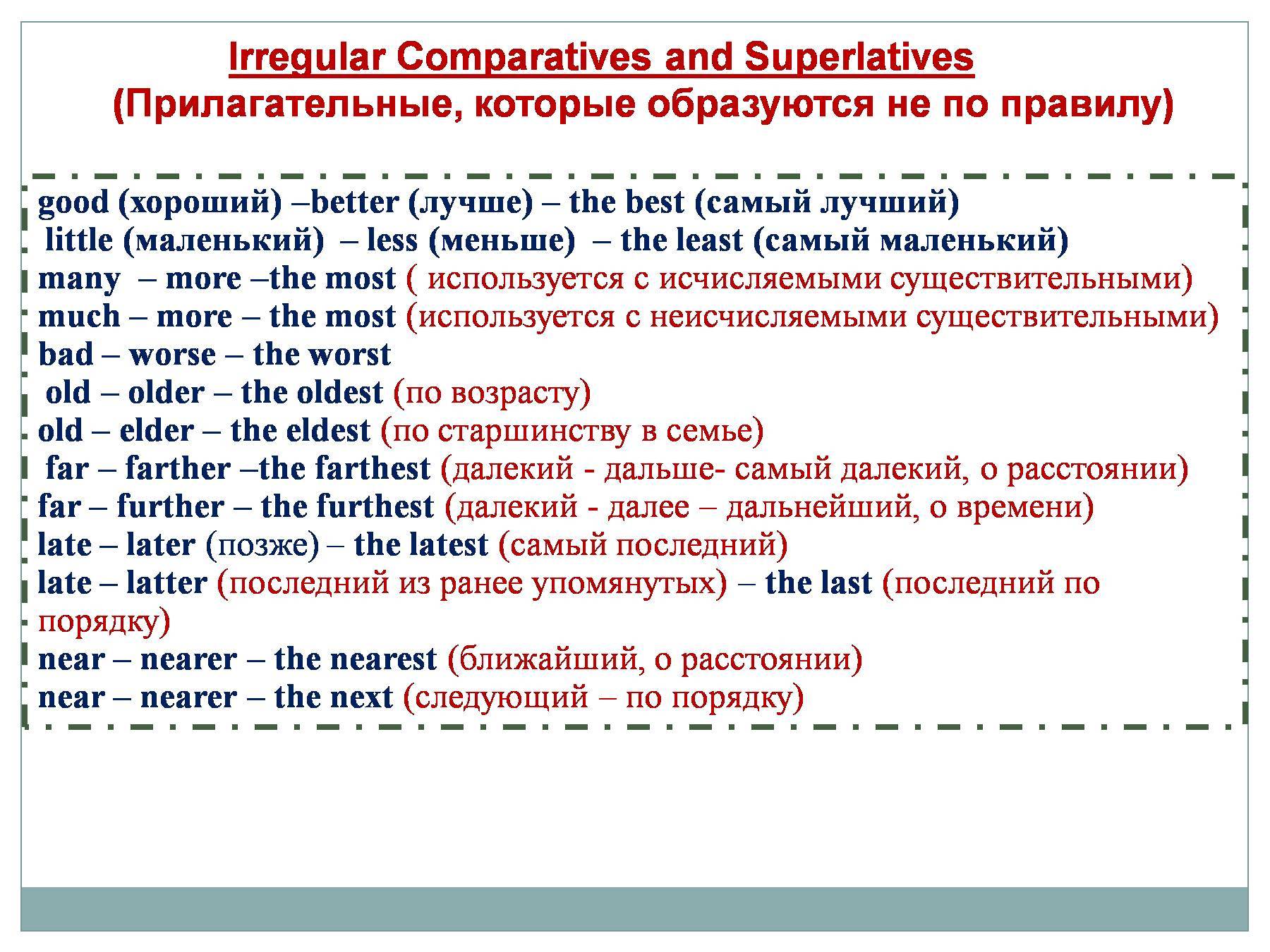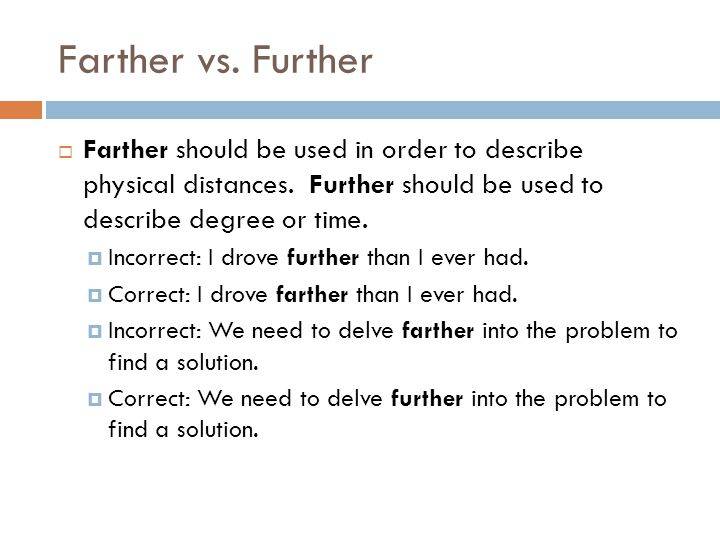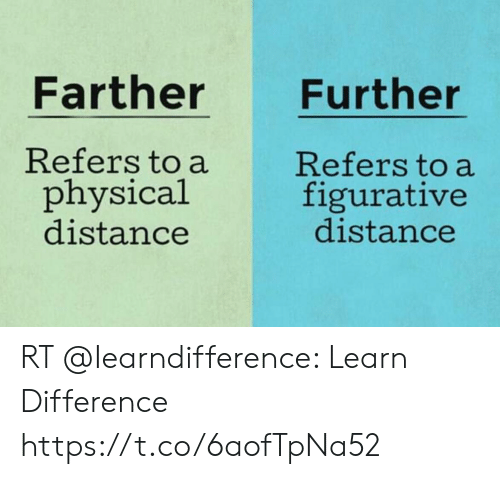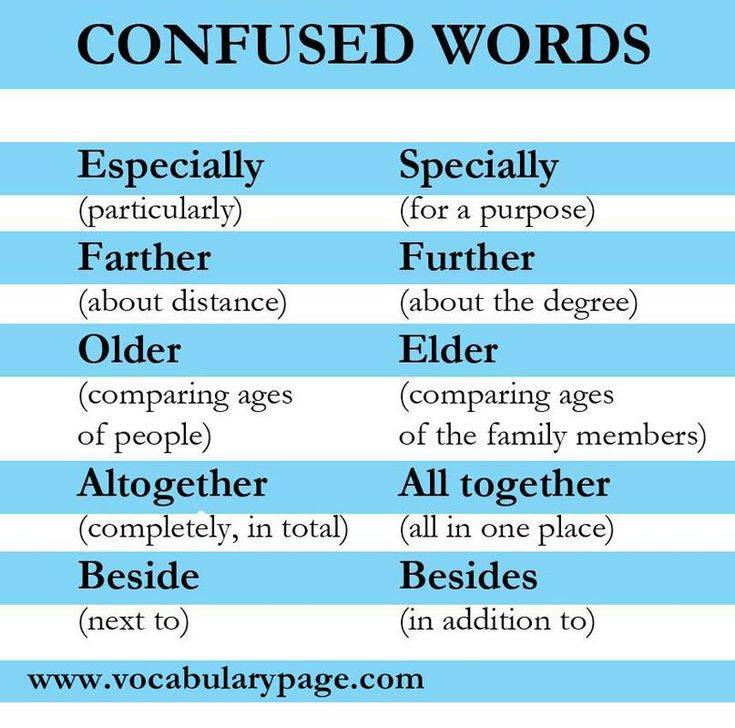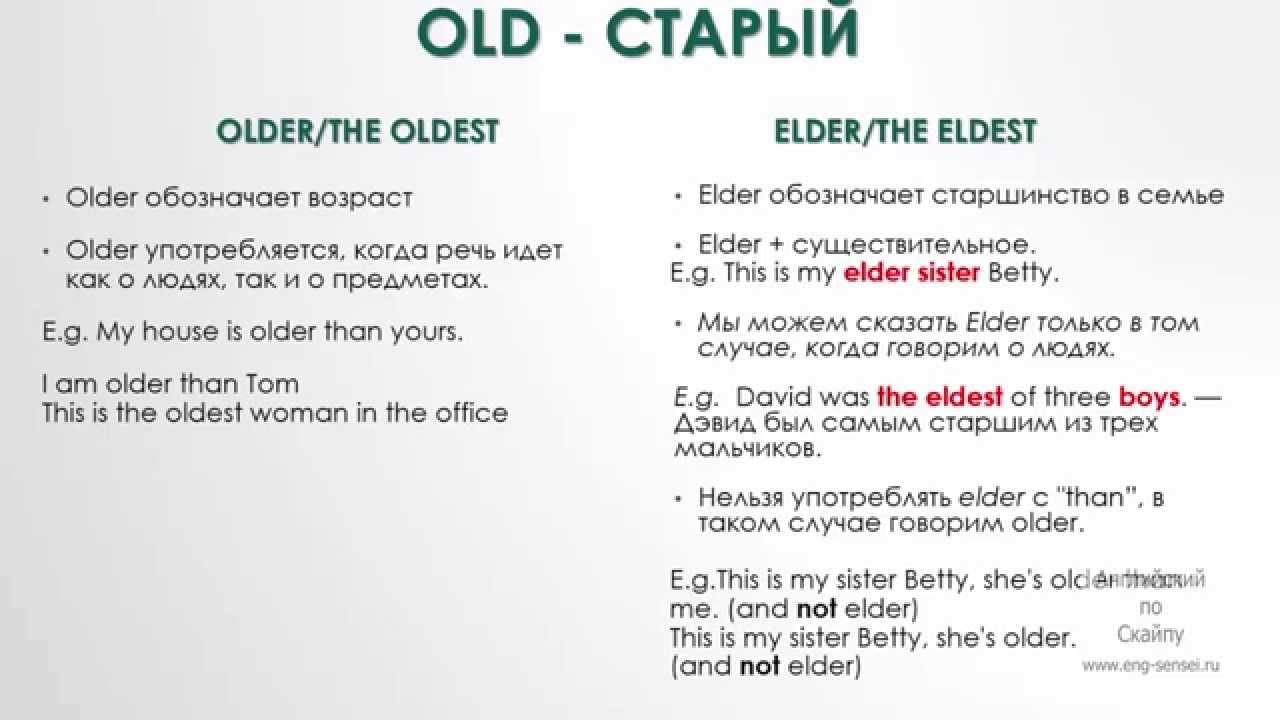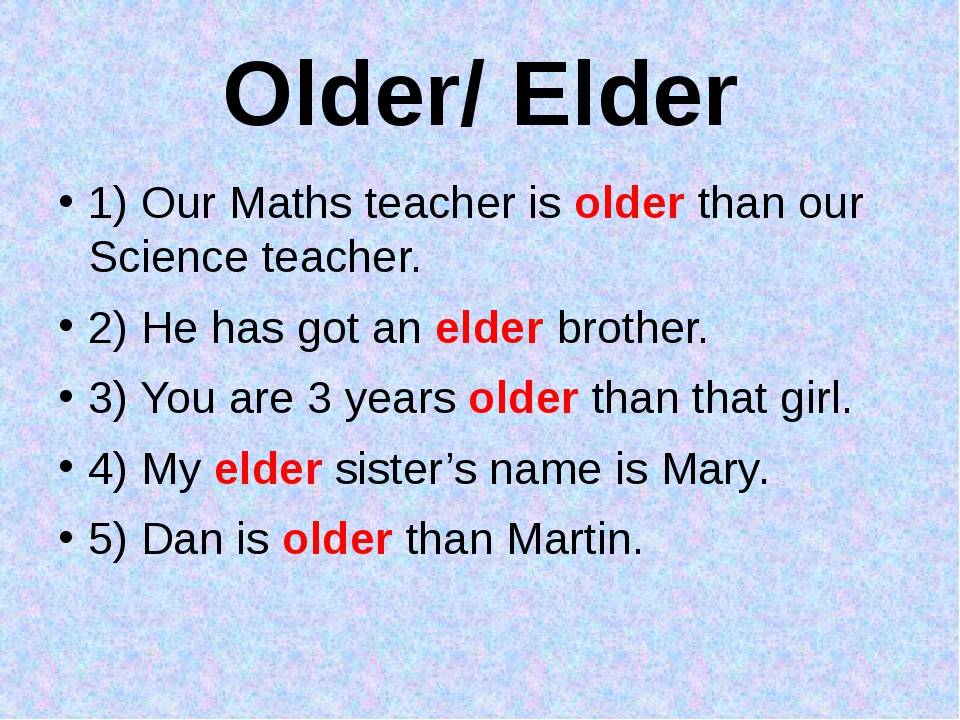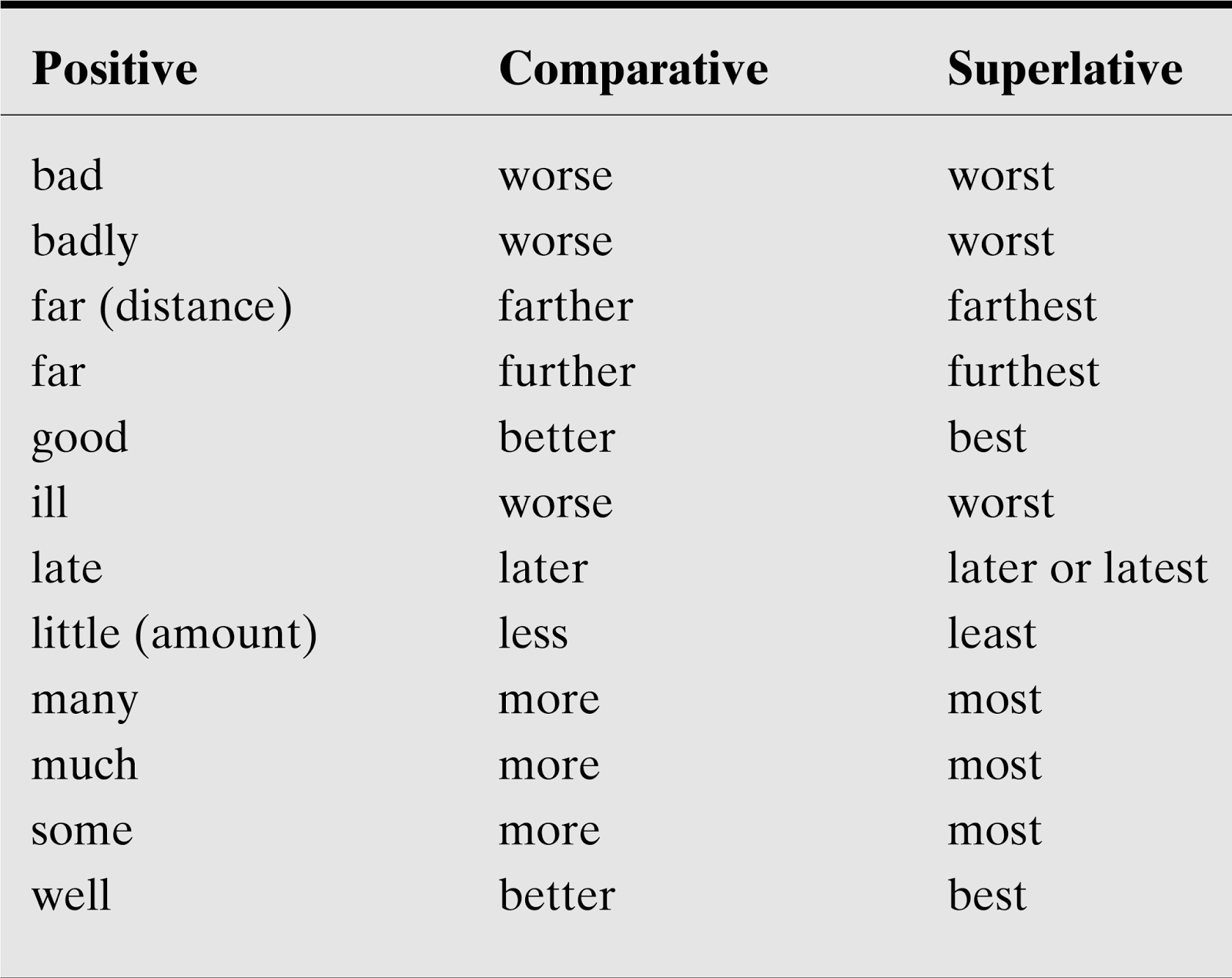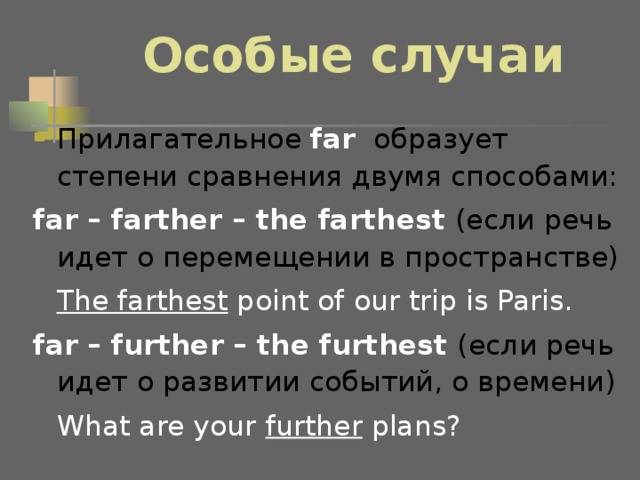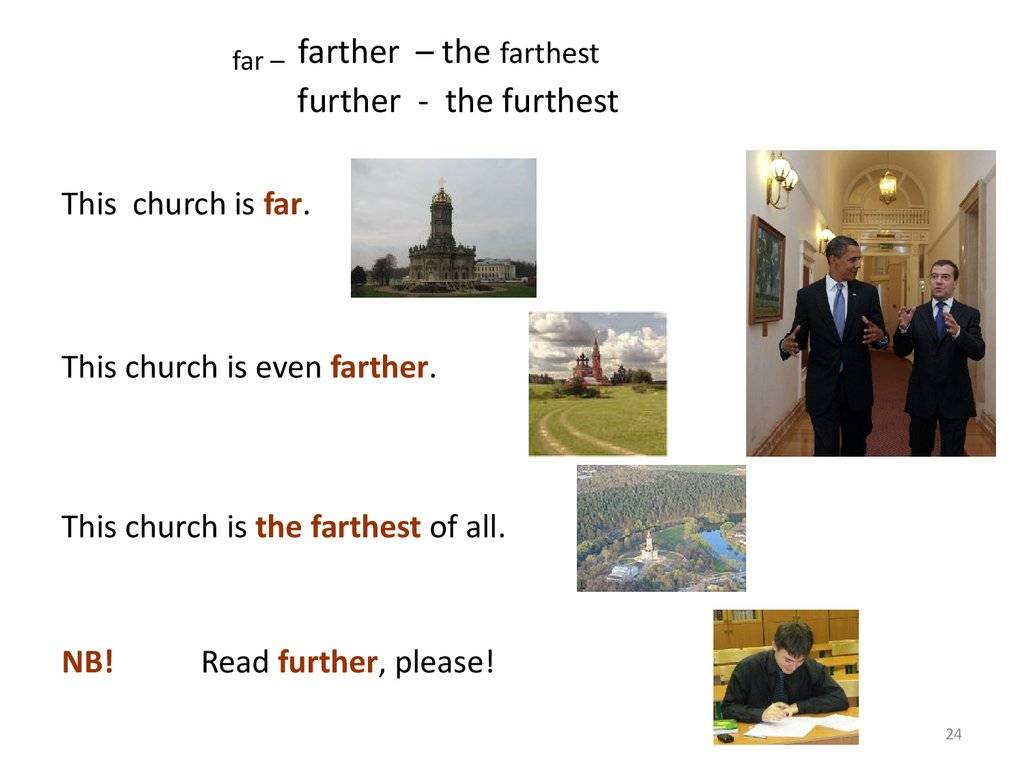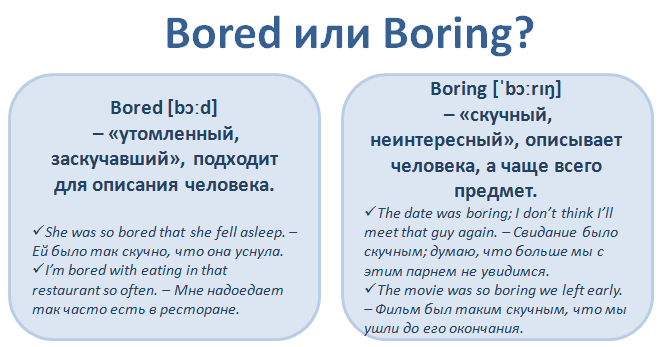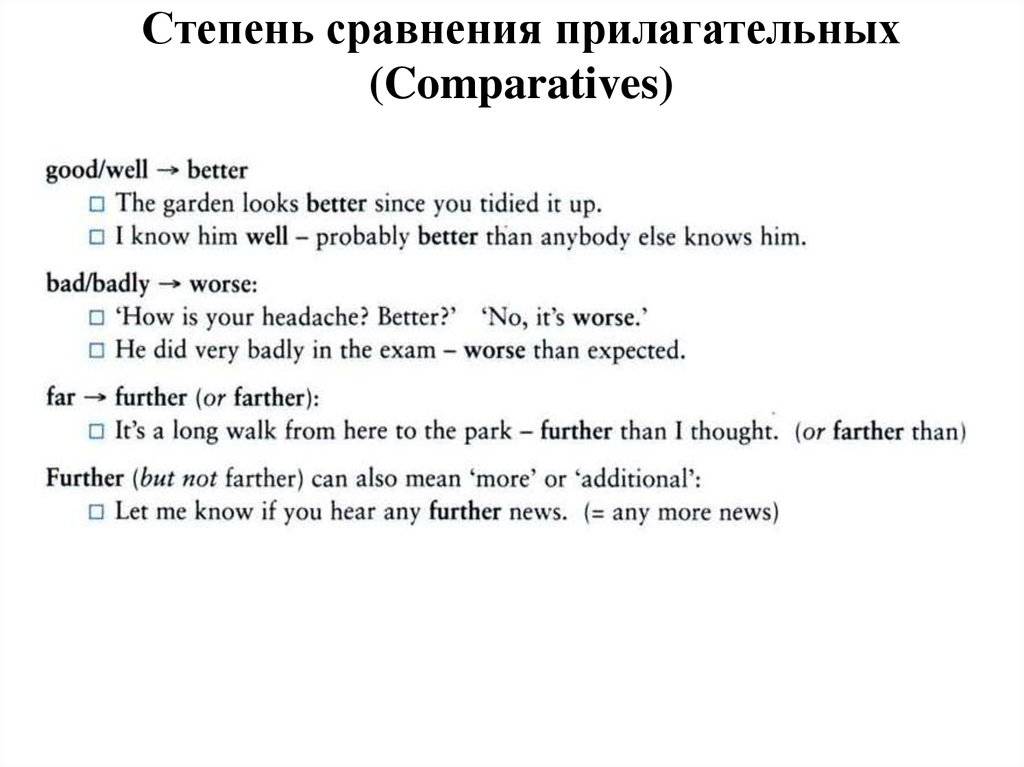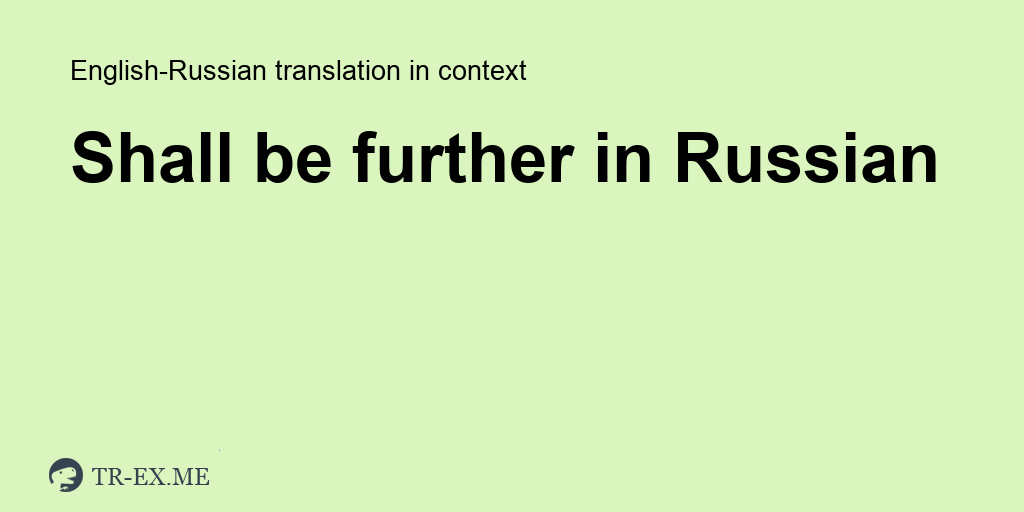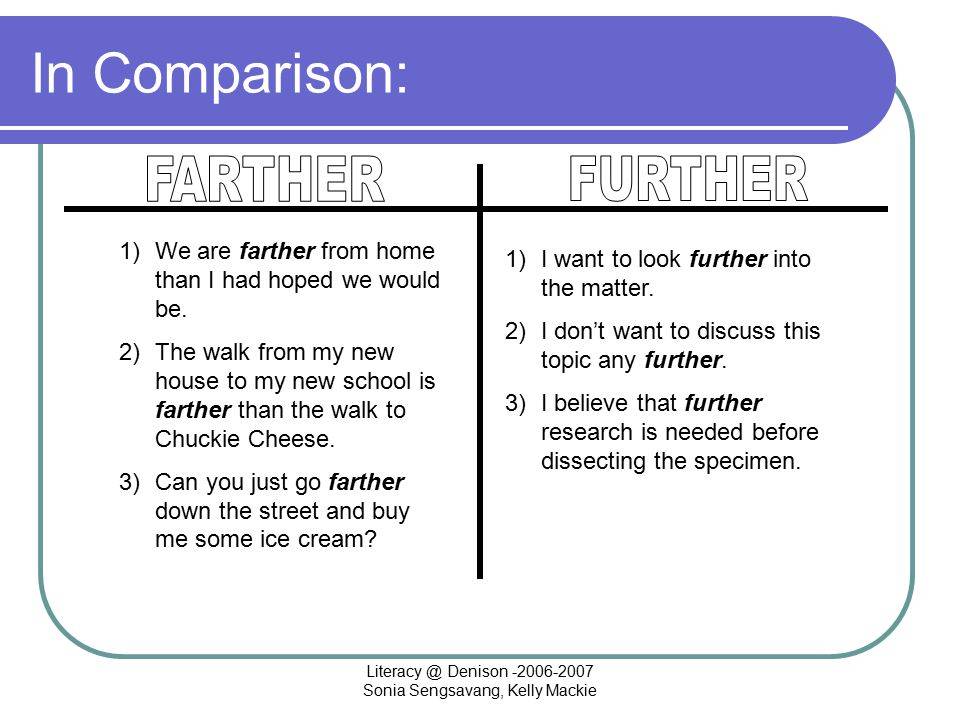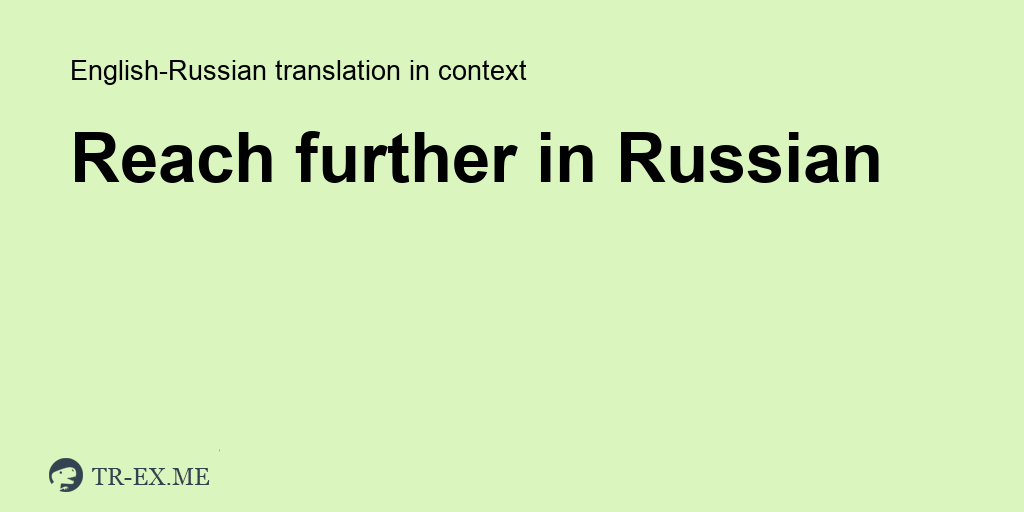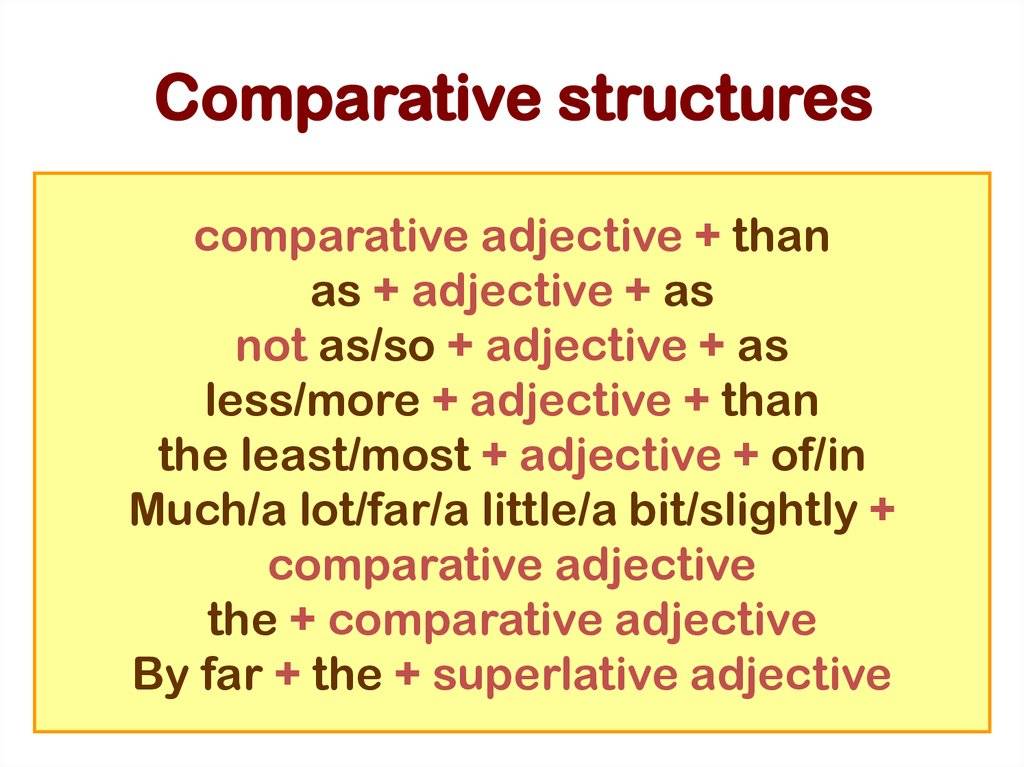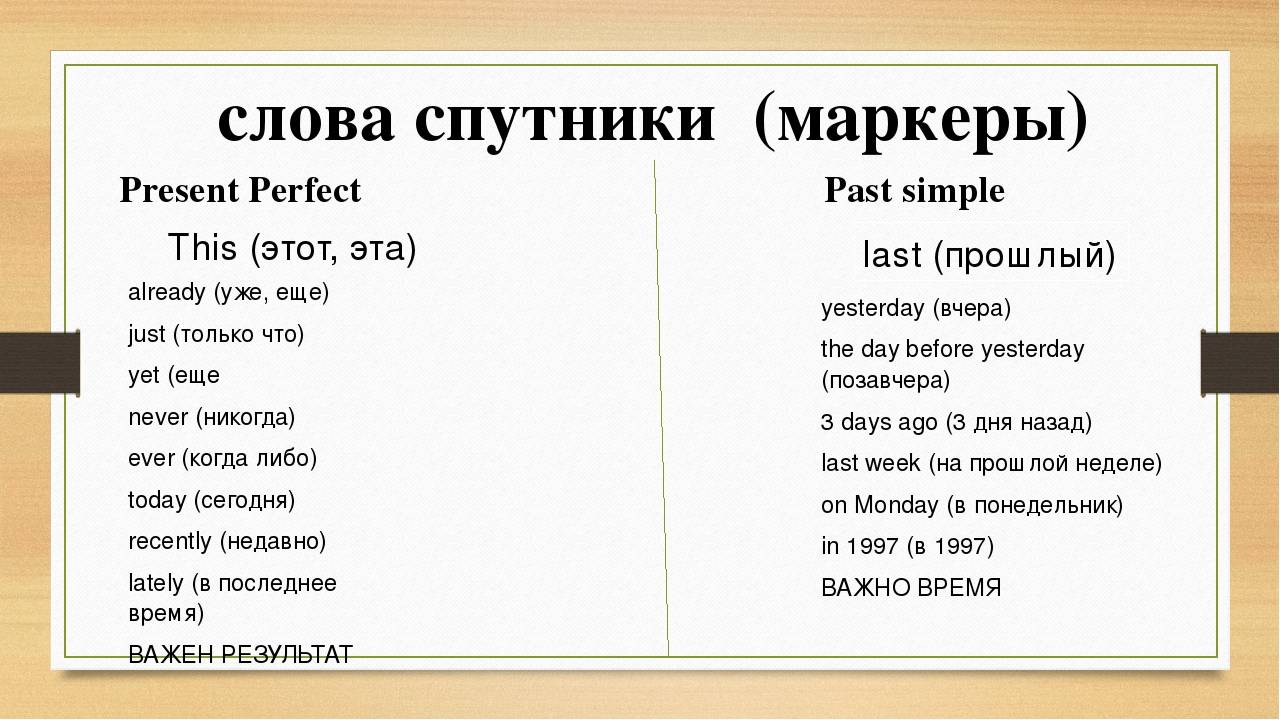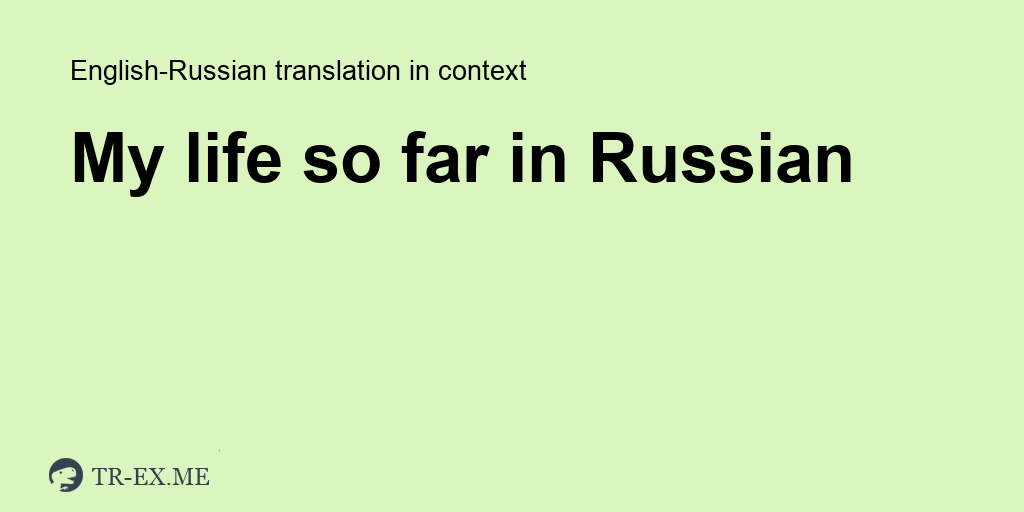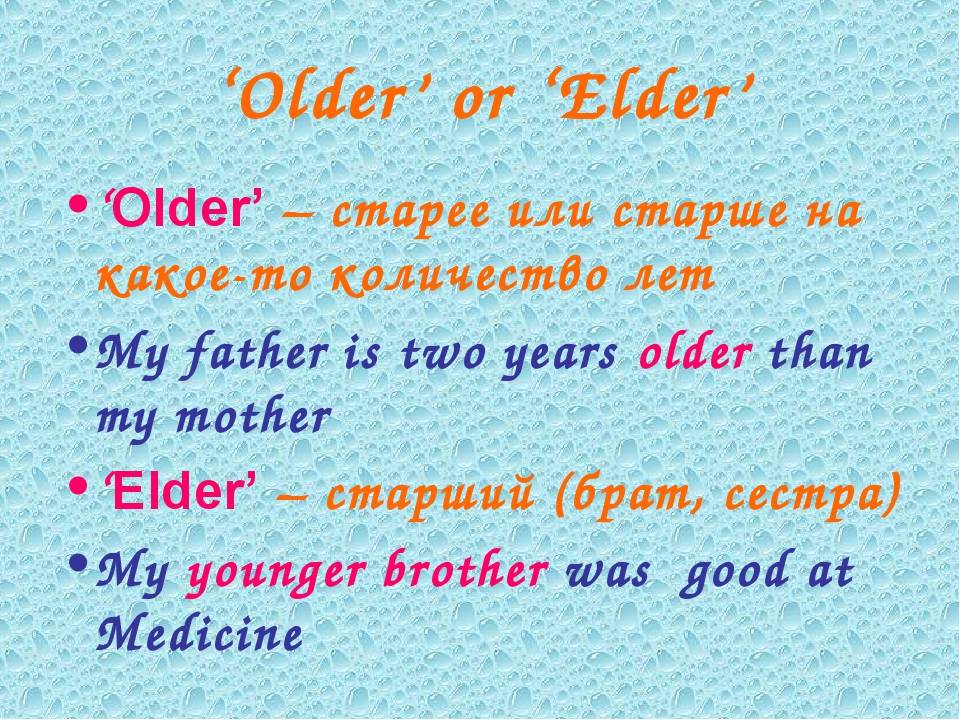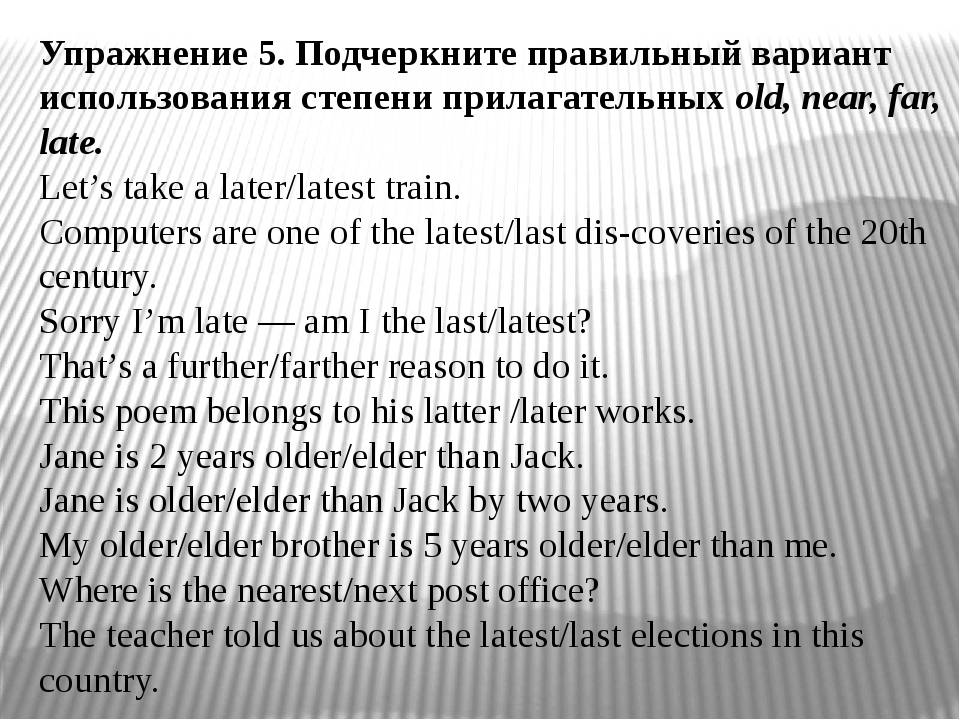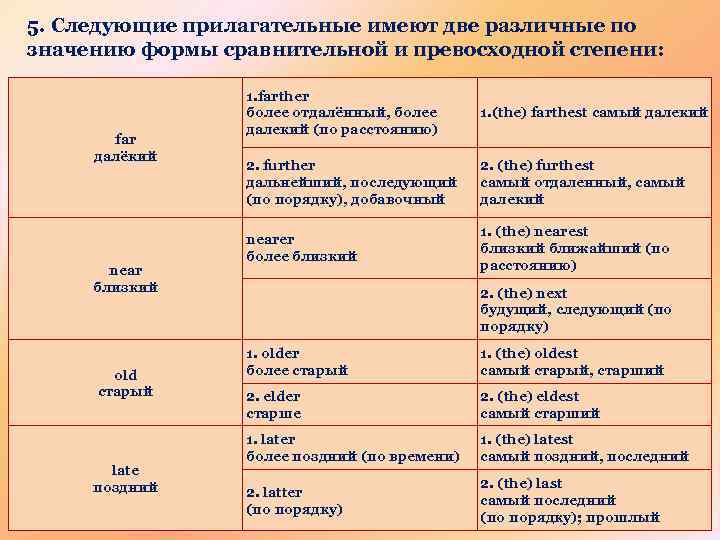Farther
Unsurprisingly, farther means “at or to a greater distance.” In Salt to the Sea, Ruta Sepetys uses this adverb to describe the activity of some sea vessels: Some boats eventually floated ashore. And some boats, like me, seemed to float farther and farther from land.
Besides physical distance, farther can also refer to “a more advanced point” or “to a greater extent.” In the following quote from The Great Gatsby, for example, farther describes how arms are stretched to a greater extent.
Gatsby believed in the green light, the orgastic future that year by year recedes before us. It eluded us then, but that’s no matter—tomorrow we will run faster, stretch out our arms farther . . .
—F. Scott Fitzgerald, The Great Gatsby
The farther you go . . . the harder it is to return. The world has many edges and it’s easy to fall off.
—Anderson Cooper, Dispatches from the Edge: A Memoir of War, Disasters, and Survival
Разница между farther и further
В американском английском различие между further и farther сводится к следующему:
- farther – это “дальше” в буквальном смысле, когда речь идет о физическом расстоянии,
- further – это “дальше” в переносном значении, когда мы говорим о продолжении какого-то действия.
Рассмотрим примеры farther:
- They can’t go any farther, this road might be dangerous. – Им нельзя идти дальше, эта дорога может быть опасной.
- The city is six miles farther. – До города еще шесть миль.
Рассмотрим примеры further, где речь идет не о физическом расстоянии:
- They’ll work no further with this team. – Они больше не будут дальше работать с этой командой.
- You’ll get further into debt. – Ты еще больше (дальше) влезешь в долги.
В британском английском данные слова различаются между собой не так явно. И один, и второй вариант можно употреблять в обоих значениях.
Рассмотрим примеры:
- She can’t work no furtherfarther. – Она не может работать дальше.
- I won’t write this letter any farther/further. – Я не буду писать дальше это письмо.
FARTHER-THE FARTHEST VS. FURTHER-THE FURTHEST
Обе группы этих степеней сравнения образовались от прилагательного far – «далекий, дальний». Обе эти группы обозначают «более далекий» — farther и further; «самый дальний» — the farthest и the furthest.
Her new apartment is much farther/ further than she told me.
Moscow is the farthest / furthest city I have ever travelled to.
Однако further-the furthest имеет также другое, более распространенное, значение, которым farther-the farthest не обладает. Это значение «последующий, дальнейший (о сведениях,
информации)». Причем в этом значении further, и the furthest взаимозаменяемы.
The Common Meaning of Farther and Further
How do the definitions of farther and further overlap? Can you use further or farther away in the same way? Some usage guides disagree, but both terms have been used interchangeably to describe physical distance. Here is a quote in which further fulfills that role:
The further from one another, the nearer one can be.
—August Strindberg, The Road to Damascus
In response to a question from a writer, deferred to Webster’s 11th Collegiate Dictionary, which states: “Farther and further have been used more or less interchangeably throughout most of their history, but currently they are showing signs of diverging. As adverbs they continue to be used interchangeably whenever spatial, temporal, or metaphorical distance is involved. But where there is no notion of distance, further is used.” Notice how further is used in this quote from The Last Battle by C.S. Lewis:
“I have come home at last! This is my real country! I belong here. This is the land I have been looking for all my life, though I never knew it till now . . . Come further up, come further in!”
When to Use Further
 While “farther” is used for measurable physical distances, “further” is used when referring to a figurative distance, a metaphorical advancement, or an extension of time or degree. For example,
While “farther” is used for measurable physical distances, “further” is used when referring to a figurative distance, a metaphorical advancement, or an extension of time or degree. For example,
- Nothing could be further from the truth.
- In order to further myself, I need to receive more schooling.
- The defendant asked for further consideration.
You can apply this same rule to the words farthest and furthest.
Further, along with its variant furthermore, can also be used as a sentence modifier to introduce a new statement that relates to a previous point. For example,
Further, I see no absolutely no reason why we should not adopt this policy.
As you can see, further is the more versatile of the two words because it has multiple different senses in which it can be used. Farther has the restriction of physical space, so when in doubt, using further is the safe bet.
Степени сравнения прилагательных
Качественные имена прилагательные и наречия образа действия в английском языке, так же как и в русском, имеют три степени сравнения:
- абсолютная (absolute),
- сравнительную (comparative)
- превосходную (superlative).
Итак, с абсолютной формой все ясно: long, far, good, active, expensive etc.
Сравнительная форма прилагательного употребляется, когда сравниваются два или более объектов или людей.
Сравнительное прилагательное может быть образовано двумя способами:
добавлением суффикса «-er» к абсолютной форме прилагательного. Это касается односложных прилагательных (long) и двусложных прилагательных с «y» на конце (pretty).
Особенности образования:
— в словах, заканчивающихся на «e», добавляется «r» в конце (lame – lamer);— в словах с одной гласной и одной согласной в конце удваивается согласная и добавляется «-er» (big – bigger);— в словах с более чем одной гласной или с более одной согласной в конце, добавляется «-er» в конце (hard – harder).
добавлением «more» перед прилагательным. Это касается двусложных прилагательных без «y» на конце (charming) и прилагательных с тремя или более слогами (powerful).
Особенности образования:
При сравнении двух предметов (людей), слово «than» расположено между прилагательным и предметом сравнения.
Превосходная степень используется, чтобы показать, что вещь или человек имеет наибольшее количество того или иного качества (в группе или в своем роде). Обычно используется с артиклем «the».
Она также может быть сформирована двумя способами.
добавлением «-est» к абсолютной форме. Это касается односложных прилагательных (big) и двусложных, оканчивающихся на «y» (lucky).
Особенности образования:
— в словах, заканчивающихся на «e», добавляется суффикс «-st» в конце (large – the largest);— в словах с одной гласной и одной согласной в конце, удваивается согласная и добавляется «-est» (big – biggest);— в словах с более одной гласной или с более одной согласной в конце, добавляется «-est» (blue – bluest);— в словах, оканчивающихся на «y», она заменяется «i» с добавлением «-est» (pretty – prettiest).
добавлением «the most» перед прилагательным. Касается двусложных прилагательных с «y» в конце, а также прилагательных с тремя слогами или более.
Примечание: прилагательные в сравнительной и превосходной степенях стоят перед всеми остальными.
Положительная форма прилагательного
Положительная форма используется в случаях, когда нет различий между двумя сравниваемыми вещами или людьми.
Чтобы сформировать положительное, мы используем «as» до и после абсолютной формы прилагательного.
Это также можно применить в отрицательном контексте, добавляя слово «not» перед первым «as». Так мы укажем, что сравниваемые объекты не похожи.
Советуем к прочтению! В чем разница между As и Like?
Прилагательные-исключения
Следующие прилагательные, степени сравнения которых образуются не по общему правилу, и их формы следует знать наизусть.
good – better – the best (хороший – лучше – лучший);bad – worse – the worst (плохой – хуже – худший);little – less – the least (маленький – меньше – наименьший);many/much – more – the most (много – больше – наибольший);old – older – the oldest (старый – старше – самый старый);old – elder – the eldest (старый – старше – самый старший) — о членах семьи;late – later – the latest/last (поздний – более поздний – последний/последний по времени);late – the latter – the last (поздний – второй из двух перечисленных – последний по порядку);near – nearer – the nearest (близкий – более близкий – ближайший по расстоянию);near – nearer – next/the next (близкий – более близкий – следующий по времени/следующий по порядку);far – farther – the farthest (дальний – более дальний – самый дальний);far – further – the furthest (дальний, далекий – дальнейший – дальнейший/добавочный).
Problem Sentences
Even though the distinction between these two words seems pretty straightforward, sometimes it can be tricky to pick out which word you ought to use in a sentence. For example, consider the following examples,
I am much further in my book than you.
Should this sentence use further or farther? You could make the case for both. For instance, I could be saying that I am further along in the metaphorical storyline of the book than you are. I could, however, also be saying that I am farther through the physical number of pages in the book than you are.
Here’s another example,
You went much further than I thought you would.
This is where context is so important, because this sentence could be saying one of two things. It could be saying that you reached a new level that is beyond (further) where I thought you would go. Or it could be saying that you went a longer distance than I thought you would go—consider the number of laps around a track.
In order to know which word to use, the context around the sentence make a big difference.
Farther и Further в других значениях
Further и farther могут принимать и другое значение, кроме «Дальше».
Употребляют в ситуации, когда необходимо рассказать об объекте находящемся далеко от говорящего. В данном случае употребляют именно farther. Это справедливо и для британского английского.
The exit is on the farther side of the field. – Выход на дальней стороне поля (на той, что вдали).
То есть используется в ситуациях, когда необходимо рассказать о дополнениях, к тому, что уже имеется.
For further information click here. – Для дополнительной информации нажмите сюда.
Встречается достаточно редко и в основном в формальной речи.
This achievement will further your career. – Это достижение поможет вашей карьере (“продвинет” карьеру).
Farther or Further From the Truth
How do you express the idea that something is completely untrue? Is the correct expression farther from the truth or further from the truth? A quote from Popularity Explained by Alex L. Freeman reveals the answer: The dictionary definition of popularity is “to be liked by many.” Based on this definition, you might predict that popular students are the cheeriest and most agreeable people in a school: kind to everyone and always willing to lend a helping hand. Such a conclusion couldn’t be further from the truth!
Are further and farther impossible to tell apart from one another? No! Nothing could be further from the truth! If you remember that only further can mean “moreover,” you shouldn’t have much difficulty. That’s one thing learned for today, but what will you investigate tomorrow?
Спорный случай
Есть ситуации, когда не понятно речь идет о расстоянии в прямом или переносном смысле.
Рассмотрим пример:
I got no farther than the second chapter, then the book just bored me. – Я добрался не дальше второй главы, затем книга мне просто наскучила.
В данном случае слово «дальше» употребляется в переносном значении, потому что имеется в виду чтение, а не прогулка. Хотя, с другой стороны, речь идет о конкретном количестве страниц, что тоже связано с физическими величинами, а значит можно принять за расстояние, хоть и с натяжкой. В этом случае любой вариант farther или further будет к месту.
Further
What’s the difference between further and farther? The definition of further does overlap with farther, but first let’s look at the meanings that are unique to this term. Further, unlike farther, can be a verb: He’d do anything to further his own interests at the company. It means “to aid in the progress of, to promote, or to move forward.” As an adverb, further means “in addition to.” As an adjective, it means “more, extended, or additional.” For instance, you might ask for further information or pursue further education. Consider this quote from The Life of Pi by Yann Martel:
You must fight hard to shine the light of words upon it. Because if you don’t, if your fear becomes a wordless darkness that you avoid, perhaps even manage to forget, you open yourself to further attacks of fear because you never truly fought the opponent who defeated you.

